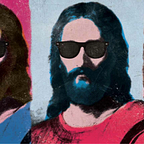Wearing Religion
Is Christianity the New Fashion?
Forever 21: An American chain of fashion retailers and personally, one of my own favorite stores.
It is often argued that Forever 21 is one of the many well-known brand names that are intensely religious. To be quite honest, I myself, just like many other customers purchasing the merchandise from this store, did not realize how explicitly “religious” the store is, until recently.
I’ll start by discussing their shopping bag. Whatever you purchase, big or small, religious or non-religious, will be cashed out and placed in Forever 21’s famous, yellow shopping bag. However, what some people may not have noticed is the biblical reference printed on the bottom of each of their shopping bags. John 3:16, (chapter 3, verse 16 of the Gospel of John) is an extremely famous passage. Not only is it famous for being a verse that originates from the Christian Bible, it is also famous for being advertised on each and every one of Forever 21’s yellow shopping bags. An article entitled, Evangelism in Fashion, published in The New York Sun in 2006 states that a spokeswoman at the Forever 21 headquarters in LA explains that “the inscription is a demonstration of the owners’ faith” (Kolben, 2006). The owners of Forever 21, Don and Jin Chang, are devout Christians. Mrs. Chang told the Business Insider in 2011 that “the store had religious roots, citing that ‘God told her she should open a store and that she would be successful’” (Bhasin & Hicken, 2012).
Rachel Kane, author of the article, The 11 Ways Forever 21 Is Selling Its Religion, states just how much Forever 21 has increased its portrayal of religion through their clothing over time. She claims, “I noticed a disturbing trend in the graphic tees. Some were just hinting at a shadow of religion, which I’ve seen before from them, but NOW? Now there are items going Holy balls to the wall with tops that have what reads like scripture on them” (Kane, 2011)
Is Forever 21 forcing their religious beliefs on all of their consumers? Or is this a way of simply incorporating their religion, as devout Christians, into their everyday business? Whatever it may be, I must say that I am one of their target consumers, who is not Christian, that is guilty of purchasing a shirt that portrays the Christian Cross. This can be best explained by Richard Santana who argues that “the desire for a relationship with a clearly identified God is similar to the need for presence that comes from the consumptive desire created in advertising” (Santana, 2005) This “desire” can only be fulfilled through actual consumption of the product, which explains why highly religious Christians may feel obligated to purchase a t-shirt that reads “Jesus is my rock and that’s how I roll”. I guess consumerizing religion really does work!
Sources:
Bhasin, Kim and Melanie Hicken. “17 Big Companies That Are Intensely Religious.” Business Insider 19 January 2012. Print.
Carrette, Jeremy and Richard King. “Spirituality and the Privatisation of Asian Wisdom Traditions.” In Selling Spirituality: The Silent Takeover of Religion, 87–122. London: Routledge, 2005.
Kane, Rachel. “The 11 Ways Forever 21 Is Selling Its Religion.” Huffington Post 8 October 2011. Print.
Kolben, Deborah. “Evangelism in Fashion.” The New York Sun 18 August 2006. Print.
